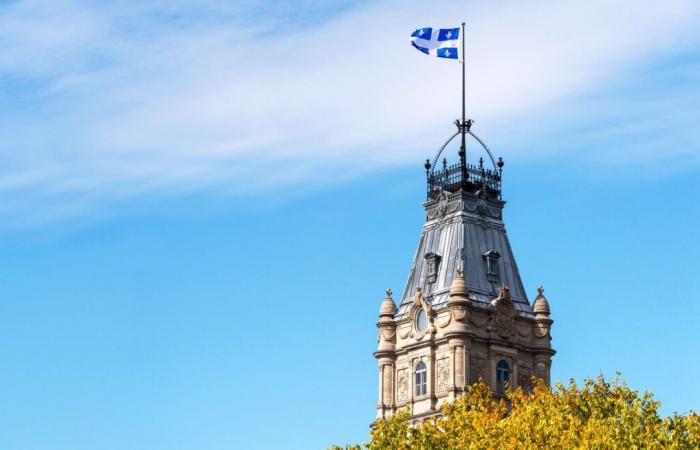In a report entitled Ambition, Affirmation, Action, tabled in the National Assembly on November 26 by the Minister of Justice Simon Jolin-Barrette, the Advisory Committee on Constitutional Issues in Quebec proposes that “the Quebec nation use all the means at its disposal to preserve its fundamental characteristics” and “also sets new benchmarks for the targets to be achieved in terms of constitutional freedom for Quebec.”
Skillfully relying on declarations from René Lévesque, Robert Bourassa, Paul Gérin-Lajoie and Joseph Facal, the Committee translates this search for constitutional freedom by formulating 42 recommendations which will merit, as the members of the Committee express wish, that “all of Quebec takes ownership of the proposed path of affirmation and [que] parliamentarians debate it[ent] », “having in mind the superior interests of the Quebec nation”.
There is reason to welcome the fact that the Committee's first recommendation proposes to “ [d]remove Quebec from a codified Constitution”, such a proposal being the subject of a broad consensus, as evidenced by the recent position taken by the Liberal Party of Quebec on the question… which would not have been without pleasing the late Benoît Pelletier.
If the Committee considers the hypothesis of limiting itself to an overhaul of the fundamental rules already in force, and in particular those contained in the Charter of human rights and freedoms, the Charter of the French language and the Law on State secularism , he evokes the idea of “going further and taking advantage of the opportunity to enrich existing law by integrating, for example, a certain number of new principles”. It is to be hoped that such an avenue will be favored, because it would, according to the committee, be “more consistent with the historical ambitions of Quebec with regard to the exercise of its constitutional freedom […].
The most innovative proposal in the report is that contained in the seventh recommendation aimed at “ [d]remove Quebec from a non-judicial Constitutional Council. Playing cautiously and aware of the fact that the attribution of judicial powers to such a council would give rise to challenges based on a Constitutional Act of 1867 conferring on the government of Canada alone the power to appoint judges capable of exercising constitutional control, the Committee suggests that the new council exercise an advisory function by producing reports and formulating opinions or recommendations.
The Committee proposes that three mandates be given to the Constitutional Council. The first would consist of interpreting the new Quebec Constitution and to this end formulating opinions intended “to induce a new dialogue with the courts”. The second mandate would be to document “the effects on the collective interests, identity and autonomy of Quebec of initiatives (laws, programs, policies or government actions) announced by the federal State, even before their implementation. implemented”. The third mandate would be to examine the content of “international treaties concluded by the federal government without Quebec having taken part in the negotiations or been consulted”.
Regarding the composition and method of appointing the members of the Constitutional Council of Quebec, the Committee suggests that they include “people who have contributed significantly to the advancement of Quebec society and who are representative of its diversity [et de] people […] carriers of varied expertise. It also recommends that “ [d]from a non-partisan perspective, an appointment to two-thirds of the members of the National Assembly [soit] considered”.
These proposals are of great interest and deserve in-depth discussion. Entrusting a new Constitutional Council of Quebec with the task of exercising, in a consultative form, a control of the constitutionality of laws, but also, as it is called in France, a control of conventionality (of conformity of treaties with the Constitution), would be everything indicated. The granting of such powers would also allow the new Council to interpret independently and distinctly the provisions of the new Quebec Constitution and to rule in particular on the scope and limits of the fundamental rights that it would guarantee.
It will also be important to determine which institutions will be able to refer the matter to the council and whether the courts will be able to make a referral to it. Concerning the number and method of appointment of its members and like the supreme courts of Canada and the United States of America, it is suggested that the Constitutional Council of Quebec include nine members, appointed — as its president or its president. also president — on the proposal of the Prime Minister and with the approval, as the committee suggests, of two-thirds of the members of the National Assembly.
A law should also determine all the rules for the organization and operation of the Constitutional Council of Quebec. This should also provide for its establishment in the National Capital in accordance with the latter's function as the seat of the institutions of the Quebec State and in respect of its historical and heritage vocation… and why not in the old palace of justice of Quebec.
On this day when the President of the Constitutional Council of France, Laurent Fabius, will address the members of the Academy of Moral and Political Sciences of the Institut de France to take stock of the state of the work of one of the pillars of the Constitution of the Ve Republic, there is reason to hope that Quebec will use its constitutional freedom to create its own Constitutional Council.
The institutional system of Quebec would be considerably enriched with the creation of such a Council which, to use the beautiful words of Jacques-Yvan Morin, would become the guardian of a great fundamental Quebec law “both the mirror and the ideal portrait » of his nation.






